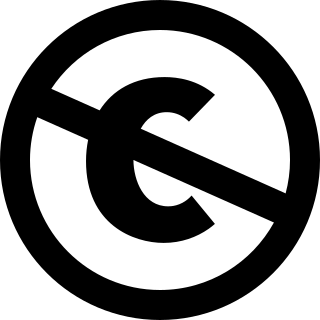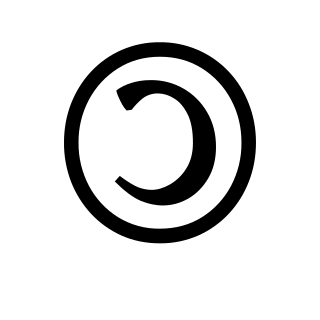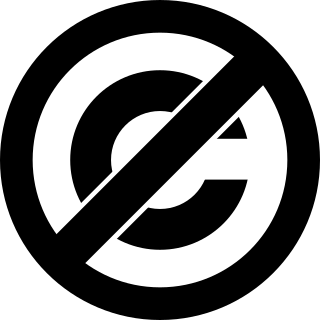
Free software, libre software, or libreware is computer software distributed under terms that allow users to run the software for any purpose as well as to study, change, and distribute it and any adapted versions. Free software is a matter of liberty, not price; all users are legally free to do what they want with their copies of a free software regardless of how much is paid to obtain the program. Computer programs are deemed "free" if they give end-users ultimate control over the software and, subsequently, over their devices.

Open-source licenses are software licenses that allow content to be used, modified, and shared. They facilitate free and open-source software (FOSS) development. Intellectual property (IP) laws restrict the modification and sharing of creative works. Free and open-source licenses use these existing legal structures for an inverse purpose. They grant the recipient the rights to use the software, examine the source code, modify it, and distribute the modifications. These criteria are outlined in the Open Source Definition.

A Creative Commons (CC) license is one of several public copyright licenses that enable the free distribution of an otherwise copyrighted "work". A CC license is used when an author wants to give other people the right to share, use, and build upon a work that the author has created. CC provides an author flexibility and protects the people who use or redistribute an author's work from concerns of copyright infringement as long as they abide by the conditions that are specified in the license by which the author distributes the work.
An anti-copyright notice is a specific statement that is added to a work in order to encourage wide distribution. Such notices are legally required to host such specific media; under the Berne Convention in international copyright law, works are protected even if no copyright statement is attached to them. However, "anti-copyright" statements typically do not take the form of either sophisticated public copyright licenses or a simple dedication to the public domain; instead, they usually just encourage wide distribution. Depending on jurisdiction, it is possible to denounce all claims to copyright in a work including moral rights in a written disclaimer.
A software license is a legal instrument governing the use or redistribution of software. Under United States copyright law, all software is copyright protected, in both source code and object code forms, unless that software was developed by the United States Government, in which case it cannot be copyrighted. Authors of copyrighted software can donate their software to the public domain, in which case it is also not covered by copyright and, as a result, cannot be licensed.

Share-alike (🄎) is a copyright licensing term, originally used by the Creative Commons project, to describe works or licenses that require copies or adaptations of the work to be released under the same or similar license as the original. Copyleft licenses are free content or free software licenses with a share-alike condition.

The free-culture movement is a social movement that promotes the freedom to distribute and modify the creative works of others in the form of free content or open content without compensation to, or the consent of, the work's original creators, by using the Internet and other forms of media.
A permissive software license, sometimes also called BSD-like or BSD-style license, is a free-software license which instead of copyleft protections, carries only minimal restrictions on how the software can be used, modified, and redistributed, usually including a warranty disclaimer. Examples include the GNU All-permissive License, MIT License, BSD licenses, Apple Public Source License and Apache license. As of 2016, the most popular free-software license is the permissive MIT license.
This comparison only covers software licenses which have a linked Wikipedia article for details and which are approved by at least one of the following expert groups: the Free Software Foundation, the Open Source Initiative, the Debian Project and the Fedora Project. For a list of licenses not specifically intended for software, see List of free-content licences.

Public-domain software is software that has been placed in the public domain, in other words, software for which there is absolutely no ownership such as copyright, trademark, or patent. Software in the public domain can be modified, distributed, or sold even without any attribution by anyone; this is unlike the common case of software under exclusive copyright, where licenses grant limited usage rights.

The WTFPL is a permissive free software license. As a public domain like license, the WTFPL is essentially the same as dedication to the public domain. It allows redistribution and modification of the work under any terms. The name is an abbreviation of Do What The Fuck You Want To Public License.

Public-domain-equivalent license are licenses that grant public-domain-like rights and/or act as waivers. They are used to make copyrighted works usable by anyone without conditions, while avoiding the complexities of attribution or license compatibility that occur with other licenses.
License compatibility is a legal framework that allows for pieces of software with different software licenses to be distributed together. The need for such a framework arises because the different licenses can contain contradictory requirements, rendering it impossible to legally combine source code from separately-licensed software in order to create and publish a new program. Proprietary licenses are generally program-specific and incompatible; authors must negotiate to combine code. Copyleft licenses are commonly deliberately incompatible with proprietary licenses, in order to prevent copyleft software from being re-licensed under a proprietary license, turning it into proprietary software. Many copyleft licenses explicitly allow relicensing under some other copyleft licenses. Permissive licenses are compatible with everything, including proprietary licenses; there is thus no guarantee that all derived works will remain under a permissive license.

Free content, libre content, libre information, or free information is any kind of functional work, work of art, or other creative content that meets the definition of a free cultural work, meaning "works or expressions which can be freely studied, applied, copied and/or modified, by anyone, for any purpose." Free content encompasses all works in the public domain and also those copyrighted works whose licenses honor and uphold the definition of free cultural work.

A free-software license is a notice that grants the recipient of a piece of software extensive rights to modify and redistribute that software. These actions are usually prohibited by copyright law, but the rights-holder of a piece of software can remove these restrictions by accompanying the software with a software license which grants the recipient these rights. Software using such a license is free software as conferred by the copyright holder. Free-software licenses are applied to software in source code and also binary object-code form, as the copyright law recognizes both forms.

Copyleft is the legal technique of granting certain freedoms over copies of copyrighted works with the requirement that the same rights be preserved in derivative works. In this sense, freedoms refers to the use of the work for any purpose, and the ability to modify, copy, share, and redistribute the work, with or without a fee. Licenses which implement copyleft can be used to maintain copyright conditions for works ranging from computer software, to documents, art, scientific discoveries and even certain patents.

The GNU Free Documentation License is a copyleft license for free documentation, designed by the Free Software Foundation (FSF) for the GNU Project. It is similar to the GNU General Public License, giving readers the rights to copy, redistribute, and modify a work and requires all copies and derivatives to be available under the same license. Copies may also be sold commercially, but, if produced in larger quantities, the original document or source code must be made available to the work's recipient.

The Definition of Free Cultural Works evaluates and recommends compatible free content licenses.
A free license or open license is a license which allows others to reuse another creator’s work as they wish. Without a special license, these uses are normally prohibited by copyright, patent or commercial license. Most free licenses are worldwide, royalty-free, non-exclusive, and perpetual. Free licenses are often the basis of crowdsourcing and crowdfunding projects.

The Unlicense is a public domain equivalent license for software which provides a public domain waiver with a fall-back public-domain-like license, similar to the CC Zero for cultural works. It includes language used in earlier software projects and has a focus on an anti-copyright message.










